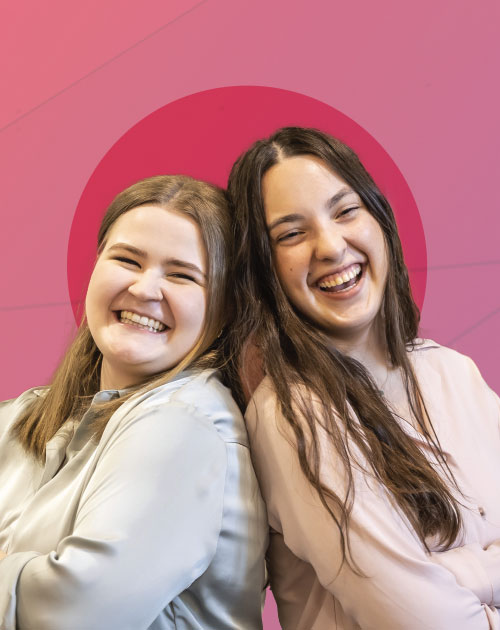Redemptive entrepreneurship at Messiah
 This is a tale of two Rachels, friends who shared a dream of running a coffee shop—and then made it a reality. Except they’re also Messiah students, so they took things a step further and mapped out a business that would further God’s kingdom. They’re living out redemptive entrepreneurship, a concept that that lies at the heart of Messiah’s Center for Entrepreneurship.
This is a tale of two Rachels, friends who shared a dream of running a coffee shop—and then made it a reality. Except they’re also Messiah students, so they took things a step further and mapped out a business that would further God’s kingdom. They’re living out redemptive entrepreneurship, a concept that that lies at the heart of Messiah’s Center for Entrepreneurship.
How’d they meet?
In their first year on campus, Rachel Beatty ’23 and Rachel Ferrence ’23—met in the Gender, Genocide and Human Rights class. They bonded over a love of crocheting and dreams of opening their own coffee shop someday.
“Rachel B. asked me if I thought it would be possible to have a coffee shop that supported vulnerable women,” said Ferrence, a social work major. “Combatting human trafficking has been one of my lifelong passions, and, after talking to Rachel more, we felt drawn to women who have been exploited by the commercial sex industry.”
Beatty, a business administration major with an entrepreneurship concentration, was taking an entrepreneurship class and writing up a business plan for the Impact Venture Challenge (IVC), Messiah’s annual campus contest that encourages students to develop and launch a faith-informed business venture that addresses important societal needs by providing seed money for the venture.

The two students began looking for local nonprofits to bring additional expertise and partnership. One of Beatty’s professors put her in touch with Peace Promise, a local organization that does outreach with the very women that Beatty and Ferrence wanted to employ and empower.
“A lot of these women said, ‘You’re the first person who treated me with dignity.’ We want them to know their inherent worth,” said Beatty.
The two women created a business plan for Ruby Coffee + Co. based the Proverbs 3:15 (NIV) verse: “She is more precious than rubies; nothing you desire can compare with her.” Then, they entered the IVC competition.
“I was confident in the plan but not my public speaking skills,” said Beatty, with a laugh.
Although IVC is open to all students of any major, Ferrence wondered if she was in the right place.
“The thought of competing against a bunch of business majors as a social work student initially terrified me. However, working with Rachel B. allowed us to come at our challenges from two different perspectives with two sets of strengths and skills,” said Ferrence. “My social work degree has given me the skills to work on an interdisciplinary team, which we do all the time, and to be able to advocate for and anticipate the needs of the survivors in whatever capacity that looks like.
They won the competition, receiving $5,000 in prize money. Things moved quickly from there. Peace Promise, who’d had a similar vision but no business plan, worked with Beatty and Ferrence to find a location, a large house that was formerly a hair salon in Camp Hill, Pennsylvania. They also partnered with Colina Coffee Co., a minority- and women-owned roaster in the Allison Hill neighborhood of Harrisburg, to create a house blend sold only through Ruby’s Coffee + Co., which plans to open later this year.
Center for Entrepreneurship
“In the beginning of this process, I did not know what redemptive entrepreneurship was, but it is now becoming one of the things I am most passionate about,” Ferrence. “I feel incredibly blessed to be a part of creating something that will go beyond ‘do no harm’ to building a creative pathway to sustainable restoration.”
Redemptive entrepreneurship is what sets Messiah apart from entrepreneurship programs at other colleges and universities. It’s the idea that faith is not compartmentalized but woven into one’s work, as outlined in the Praxix book, “The Redemptive Nonprofit.”
Messiah’s Center for Entrepreneurship helps put business students in touch with nonprofits, mentors and job opportunities.
The advisory board includes alumni such as Messiah’s entrepreneur-in-residence Peter Greer ’97; Corrie Leister ’00, who runs a local cabinet and furniture refinishing business; and Josh Wood, national outreach director of Elevate Church in Charlotte, North Carolina. They meet with students and help with IVC.
“Most people on the board are living examples,” said Wood. “How do I become a redemptive entrepreneur? Let’s walk through what that would look like.”
Redemptive entrepreneurship goes beyond even ethical entrepreneurship. It’s more than doing things right. It’s creative restoration through sacrifice, loving and serving.
“Messiah grads have been living this out for years. The center is new, but Messiah grads applying their faith to entrepreneurship and using business for good is not new,” said Greer.
Future: Ruby Coffee in five years
The goal, eventually, is to have a survivor-led team managing the shop, with plans to expand the impact of the coffee shop. By providing trauma-informed and Christ-centered employment, they want to support as many women as possible and provide skills training to help them transition into their next job or career.
“In five years, I would love to have seen some of those successful transitions while also remaining a place that the women can come back to for ongoing support. One of my dreams for this business is being able to support survivors who want to go on the journey of entrepreneurship,” said Ferrence.
—Anna Seip
Helping the environment with a concrete business plan
What is the Center for Entrepreneurship?
In the 2021-2022 academic year, Messiah University launched the Center for Entrepreneurship, including the Innovation Lab, a space where students foster creativity and learn directly from faculty and industry leaders. The center uses hands-on business ventures and provides knowledgeable resources for students to develop their skills and create a passion for entrepreneurial efforts in the community.
“It has been a true joy to be a part of a phenomenal entrepreneurial ecosystem at Messiah that is comprised of curious students, alumni, faculty and business owners. There are over 25 people actively investing into the lives of our entrepreneurs every year, and it is humbling to see how this work is helping to train and develop our students,” said Andy Babyak, assistant dean of business.
Funding for the center was provided by Donna Earhart in memory of her late husband, Terry, an educator and mentor at Messiah for 22 years. He was involved in many Messiah initiatives, including the Genesis Solar Car Team, the International Business Institute, the Students in Free Enterprise (SIFE) Club and the Investment Club.